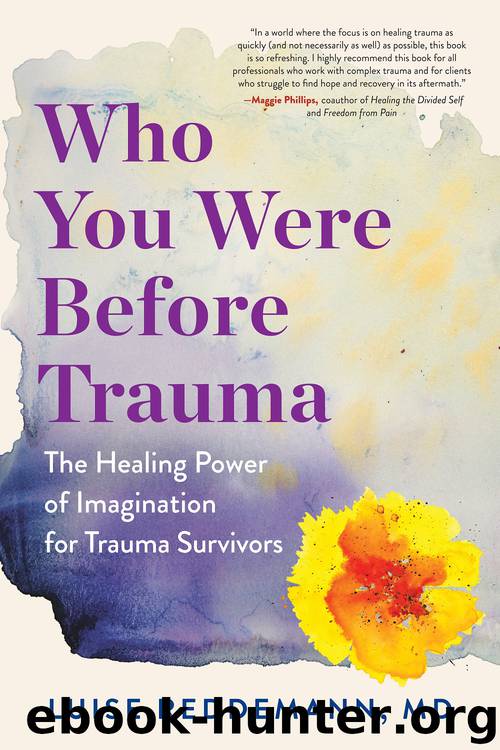Who You Were Before Trauma by Luise Reddemann

Author:Luise Reddemann
Language: eng
Format: epub
Publisher: The Experiment
Published: 2020-04-15T20:29:29+00:00
The following week the patient reported that he had been doing well. He said he sometimes thought of his wobbly knees but noticed that neither the past emergency nor the childhood trauma were bothering him. Whenever he thought about the childhood incident, it didn’t bother him as much. Positive cognition continued to work. A few weeks later Mr. N had to tend to another serious accident, and he noticed that he was now much more relaxed.
This, of course, is an ideal development path, and I’m always delighted when I get to experience and be part of it. This case history clearly reveals the individual steps in the process. But it’s also important to discuss possible difficulties and how to deal with more difficult and serially traumatized patients.
When patients have been traumatized multiple times, it’s important for them to find ways to take all their hurt parts to the safe place. We used to think that it was sufficient for the patient to simply imagine the storage safe, but today I think differently. The Safe Exercise is not a causal intervention and thus relatively uncertain. On the other hand, if the patient can successfully imagine that all their experiencing parts are in the safe place, and if we have understood at least somewhat the extent to which these parts have been hurt, then, metaphorically speaking, these parts can stay in the safe place. After all, they are being taken care of by the helpful beings with compassion. That means we can pursue the trauma exposure once we know that all the experiencing parts are safe. To an astonishingly high degree, this reduces the risk of activating the trauma via affect bridges, which connect past events to the present.
Generally, for people who have been traumatized several times, the degree of suffering does not reach as far back as it does in the case of single traumas. Every step toward less suffering can be seen as a gain. Many years ago I wondered: “What should we do if the Observer Technique provides relief, but we cannot achieve enough distance from the trauma?” This problem no longer arises, presumably especially because of the careful preparation for all hurt ego states.
We used to proceed by working through the trauma again and, in this case, by using EMDR. The preparatory work improves resilience to the extent that the EMDR method, with its focus on intensely painful feelings, remains relatively tolerable. Today, I believe that it can increase the therapists’ certainty if they have this at their disposal.
In the example presented here, the consolation offered to little Jack was brief but effective. Often, you need to take much more time to console the patient, and I believe that consoling is as important as working through the traumatic situation. Clinical experience shows that adequate consolation leads to a significant reduction in subjective units of distress, seeing that they appear after working through a trauma.*
Incidentally, therapists can check on their own by asking their patients about the subjective units of distress and about consolation immediately following a workthough.
Download
This site does not store any files on its server. We only index and link to content provided by other sites. Please contact the content providers to delete copyright contents if any and email us, we'll remove relevant links or contents immediately.
Should I Stay or Should I Go? by Ramani Durvasula(7652)
Why We Sleep: Unlocking the Power of Sleep and Dreams by Matthew Walker(6694)
Fear by Osho(4727)
Flow by Mihaly Csikszentmihalyi(4684)
Rising Strong by Brene Brown(4448)
Why We Sleep by Matthew Walker(4433)
The Hacking of the American Mind by Robert H. Lustig(4372)
How to Change Your Mind by Michael Pollan(4354)
Too Much and Not the Mood by Durga Chew-Bose(4335)
Lost Connections by Johann Hari(4169)
He's Just Not That Into You by Greg Behrendt & Liz Tuccillo(3889)
Evolve Your Brain by Joe Dispenza(3668)
The Courage to Be Disliked by Ichiro Kishimi & Fumitake Koga(3478)
Crazy Is My Superpower by A.J. Mendez Brooks(3394)
In Cold Blood by Truman Capote(3374)
Resisting Happiness by Matthew Kelly(3337)
What If This Were Enough? by Heather Havrilesky(3308)
The Book of Human Emotions by Tiffany Watt Smith(3292)
Descartes' Error by Antonio Damasio(3270)
